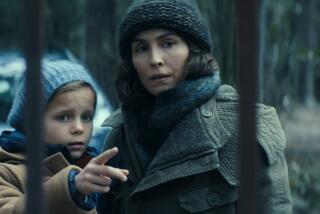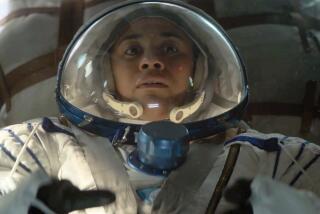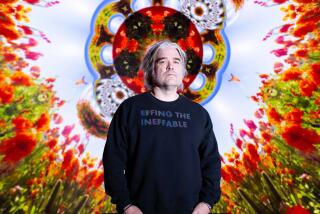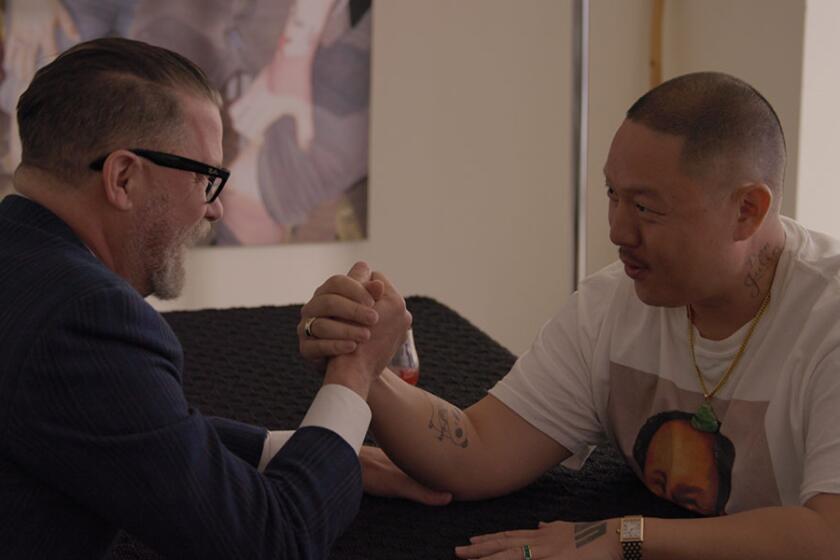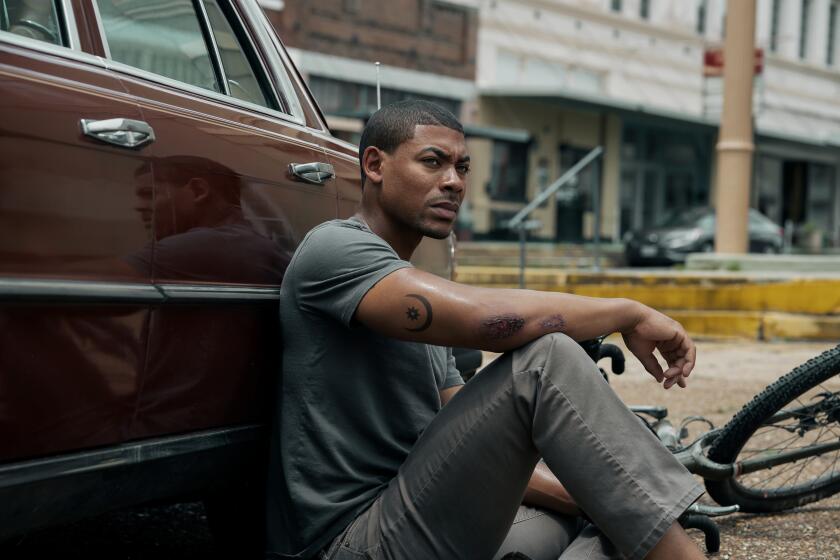MOVIE REVIEWS : TAKING IN THE SIGHTS OF INNER AND OUTER JUNKETS : Hilarious and Inventive Trip to ‘Innerspace’
Using a twist on the ingenious premise of “Fantastic Voyage”--miniaturized travel within a human body--and a pair of very different but equally irresistible leading men, “Innerspace” (citywide) is densely inventive and consistently hilarious.
The 1966, “Fantastic Voyage” took one boatload--pardon, subminiaturized--crew of earnest scientists through the circulatory system and up to the brain of a researcher whose potentially lethal blood clot they blasted away with a laser. Those who saw it are not likely to forget its astonishing inner-body landscapes nor the sight of Raquel Welch, her wet suit a mass of attacking antibodies.
As directed by Joe Dante, this script for “Innerspace,” by Jeffrey Boam and Chip Proser from Proser’s story, changes things significantly. Instead of an anesthetized patient and a voyaging crew, there’s a one-man explorer ship, piloted by Lt. Tuck Pendelton (Dennis Quaid), and a nerve-jangled supermarket clerk, Jack Putter (Martin Short), who becomes his inadvertent host body.
How this unlikely pair, the smooth, hell-raising Air Force test pilot and the sweet, semi-milquetoasty checker, get together in the first place is the fault of “Silicon Valley industrial spies,” who interrupt the action after Quaid and his ship have been miniaturized enough to rest inside a hypodermic syringe. The experiment was intended to be done within the bloodstream of a rabbit, but during the ensuing pursuit, it’s the backside of Short that receives the injection.
The multinational baddies (Kevin McCarthy, Fiona Lewis, Vernon Wells) need Quaid, since he carries half the experiment’s mechanism with him. Quaid needs their half to become his normal size again. Additionally, Quaid is racing against time before his oxygen runs out.
The new twist is that Quaid and Short begin to work as one body, once Quaid has attached electronic gizmos to Short’s auditory and optic centers. (A nasty bit of business, this: Short feels “a white-hot sewing needle through the pupil of his eye,” and similar ear pains. What price electronic gimmickry if half your audience is doubled over in empathic pain? Quaid’s ship, with its little grappling hooks attaching to Short’s spongy interior linings, stirs up pretty painful responses as well.)
As he’s shown before, in “Gremlins” and “Explorers,” director Dante isn’t one for serene vistas or uncluttered action; he has almost a cartoonist’s-eye view of life and he drops in little affectionate homages to old movies at every turn. (Villain Wells is a dead ringer for Jack Palance in “Shane.”) Here, his scientist’s lab is a homey, messy place; papers all over, a lounging Bugs Bunny cartoon rabbit as a mascot. His inner-body scapes, technically cleaner than in the earlier movie, don’t have quite its scale or jaw-dropping grandeur. And Dante’s action is the same: human, folksy, appealing.
He has cast two warm and marvelously adroit actors to carry it out. Between “Innerspace” and the yet-to-be-released thriller “The Big Easy,” Quaid, with his killer grin and his sleepy self-confidence, has gotten a corner on the role of the securely sexy American male. Quaid luxuriates in “Innerspace’s” extroverted character, making you forget completely that he’s relatively constricted in the physical space allowed him.
Short’s opportunity is at the opposite end of the physical spectrum. There seems to be nothing he can’t do, from “Twistin’ the Night Away,” which--oddly enough--he dances as if possessed from within, to a hairsbreadth balancing act between a refrigerated truck and the windshield of a car, which he does with the elan of Cary Grant. (Director Dante’s camera angles add enormously to the success of this sequence, making you forget that it isn’t exactly the cinema’s newest scare tactic.) If somehow, Short, a brilliant Canadian actor-comedian whose looks are a cross between E. B. White’s Stuart Little and Jim Dale, eluded you on “SCTV” or in “The Three Amigos,” “Innerspace” will be a superlative introduction.
Between the two men is Quaid’s journalist girlfriend, Lydia (Meg Ryan), mad about the man, but fed up with his drunken antics before he goes off to the innerspace lab. There are delicious complications when she and Short join forces to safeguard Quaid. The macho lieutenant’s barked commands, from inside Short, begin to change the gentle grocery man. He, in turn, lights up when Ryan is around, which rattles Quaid. It is all so deftly played that the romantic denouement, with the camera focused on Short’s face, is unexpectedly touching.
At two hours, “Innerspace” is certainly crammed with action, but it’s one of the rare Spielberg-touched productions that doesn’t suffer from numbing Gargantuanism (maybe it’s the miniaturization theme). Although crammed with technical wonders--Short’s rubber face maneuver, the balancing car-chase sequence, the inner-body scenes, the half-pint master villains--it remains adroit and affectionate, its human touch around to the very end. ‘INNERSPACE’
A Warner Bros. release of a Steven Spielberg presentation from Amblin Entertainment of a Guber-Peters production. Producer Michael Finnell. Co-producer Chip Proser. Executive producers Spielberg, Peter Guber, Jon Peters. Co-executive producers Frank Marshall, Kathleen Kennedy. Director Joe Dante. Screenplay Jeffrey Boam, Proser. Story by Proser. Camera Andrew Laszlo. Editor Kent Beyda. Music Jerry Goldsmith. Production design James H. Spencer. Art direction William Matthews. Set decorator Richard C. Goddard. Costumes Rosanna Norton. Sound Ken King. Visual effects supervisor Dennis Muren. Special makeup effects designed and created by Rob Bottin. With Dennis Quaid, Martin Short, Meg Ryan, Kevin McCarthy, Fiona Lewis, Vernon Wells, Robert Picardo, Harold Sylvester, William Schallert, Henry Gibson, Orson Bean, Kevin Hooks, Kathleen Freeman, Dick Miller, Ken Tobey.
MPAA-rated: PG (parental guidance suggested).
Running time: 2 hours.
More to Read
Only good movies
Get the Indie Focus newsletter, Mark Olsen's weekly guide to the world of cinema.
You may occasionally receive promotional content from the Los Angeles Times.
